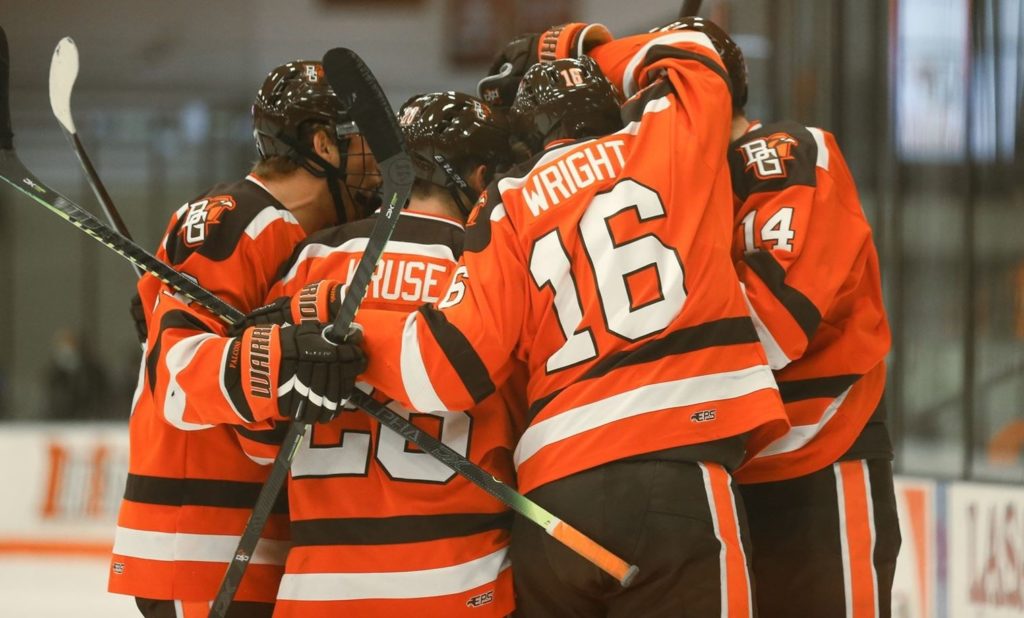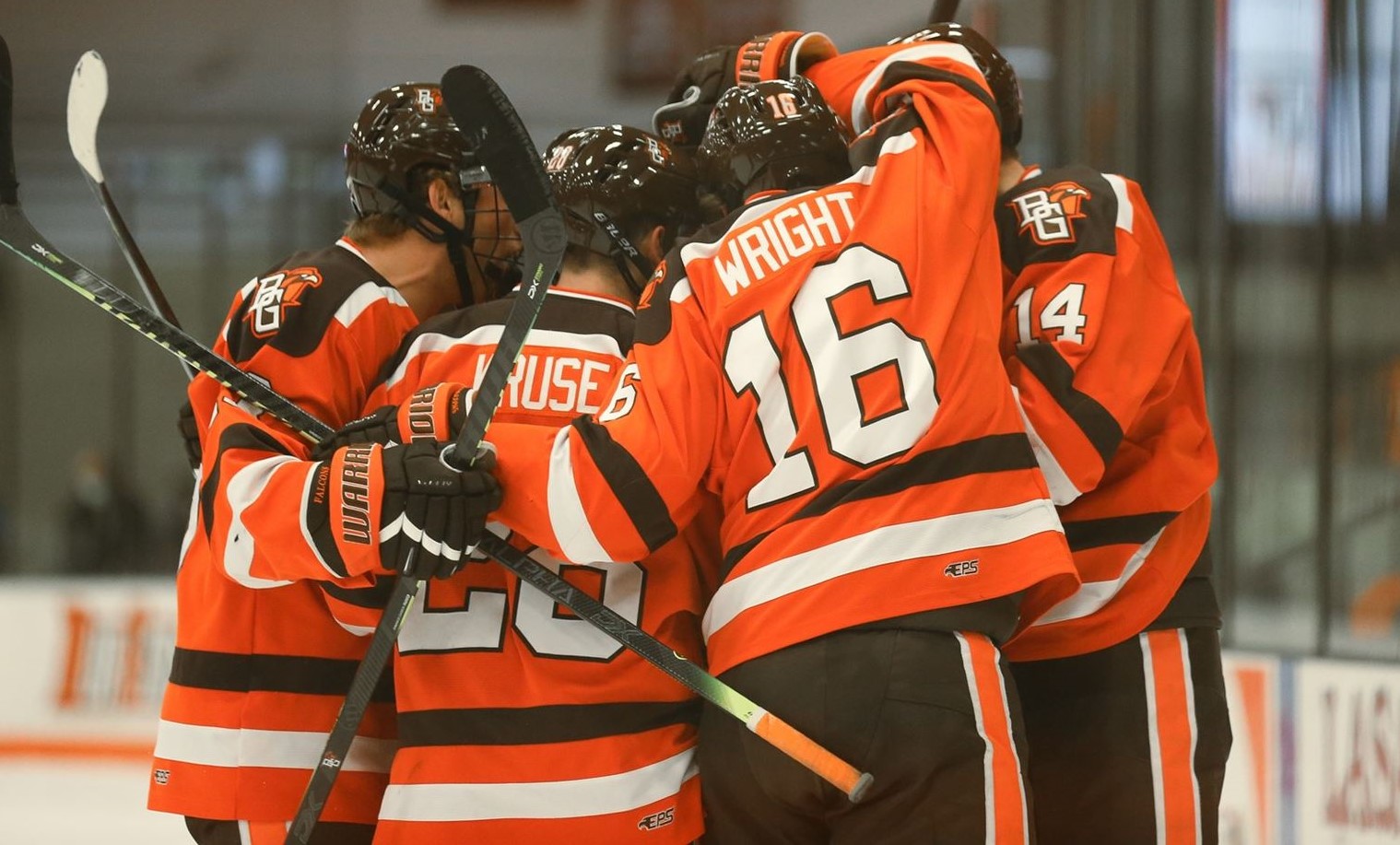
Bowling Green’s change in fortunes came at the most opportune time.
During a stretch in early February when they lost four games in a row to what ended up being the top two teams in the WCHA standings (Minnesota State and Lake Superior State), the Falcons were looking for a spark when they took on Northern Michigan the weekend of Feb. 20.
The urgency became even greater when they skated to a scoreless tie with the Wildcats and ended up losing in the shootout.
“You go into game one of that series, and it’s 0-0, and our record leading up to that hadn’t been great,” BGSU coach Ty Eigner said. “Our guys were pressing a little bit and weren’t playing as confidently as you’d hope.”
The next night, Bowling Green’s confidence levels returned to normal. They won that game 6-2 to close out the series and earn a much-needed win.
“To score six the next night, you could feel with every goal we scored the stress lessened, everybody kind of freed up and more guys were engaged,” Eigner said of a game in which five different players managed to score. “And once the game was over we had a bunch of guys feeling pretty good about how they were playing.”
That feeling carried over into next week’s series against Alabama Huntsville, too — BG swept the Chargers 5-0 and 4-2 in a home-and-home to close out the regular season. And since that scoreless tie, BG’s big guns have put up good numbers. Connor Ford scored five goals in the past three games to give him a WCHA-best 16 on the season while Brendan Kruse, who leads the league in scoring, had a goal and four assists.
Now, the trick is keeping the momentum going this weekend for BG’s best-of-three playoff quarterfinal series against Northern Michigan. The Falcons closed out the season on a three-game winning streak while the Wildcats seemed headed the opposite direction, losing four of their last six.
“It’s amazing what one weekend can do, on both the positive and the negative side of things,” Eigner said. “Thankfully our guys have been able to get back and correct things to play the game we want to play, and we felt good about how we finished. And our confidence is good, which is a nice thing going into the playoffs.”
The Falcons are still looking to recapture some of the magic they had to start the season, when they won 14 of their first 16 games. That run of form ended in late January when they were swept in a nonconference series at Bemidji State. Two weeks later, they were swept again at the hands of Minnesota State, followed by two losses against Lake Superior State the subsequent week.
“Every year’s got peaks and valleys to it,” Eigner said. “Our start was great, but then we had that little stretch where we lost four games in a row. Prior to going up to Mankato (Feb. 5-6), everything was great. Everyone was excited about where we were at, what we could potentially do, and then we didn’t perform. And then we came back home and didn’t play well and lost two more.”
In all, BG only lost five conference games. In a normal year, that wouldn’t be a huge deal for a team with MacNaughton Cup aspirations. But in this pandemic-shortened season in which everyone played only 14 conference games, it wasn’t going to be good enough (especially since champions Minnesota State lost just one). Against the other three teams who finished in the top half of the standings (MSU, LSSU and BSU), the Falcons went 1-7-0.
Still, the Falcons enter this weekend knowing that they’re still, as Eigner puts it, “in the conversation” for the NCAA tournament.
“We know we’re in the conversation. We have no idea what that conversation is, but we’re there. All we can do is prepare the best we can for this weekend, and we feel like the more games we can win, the better it looks for us.”
The fact that they’ve been able to play a full 28 games — even getting in some rare, for this season, nonconference series — can only help them when the committee looks at the entire body of work. The fact that they swept both ECAC champions Quinnipiac and Atlantic Hockey bubble team Robert Morris early in the season bodes well for them.
“We just need to continue to build our resume,” he said. “That’s all we can really focus on, and really, if we want to make the national tournament, the one way we can guarantee that is by winning our playoffs.”
WCHA returns to an old format (sort of)
Just so we’re clear: The WCHA Final Five isn’t coming back. Really.
But due to the pandemic, this season’s WCHA playoff format will look a little more like the days of the Final Five, a concept the league abandoned after the 2016 season in favor of more games on campus sites.
Since 2017, the conference tournament has been played over three weeks, with best-of-three quarterfinal and semifinal series culminating in a single-game conference title game on the home ice of the highest remaining seed.
This year, because the pandemic forced a boatload of makeup games, the league decided to ditch the three-week playoff format in favor of an extra week to allow teams to play their rescheduled games, if necessary.
This means a move back to a format similar to the Final Five — a best-of-three quarterfinal followed by a single-elimination semifinal and title game, hosted by the top remaining seed.
Some other leagues, like the Big Ten and the NCHC, are this year doing away completely with three-game series format in favor of a fully single-elimination tournament at one site.
Eigner said the WCHA coaches elected to keep the three-game series because they felt it was more fair, especially with only 14 league games. (The NCHC, comparatively, played 22 or 24 games while every Big Ten team played at least 18, and most played more.)
“In our league, we felt like to maintain the integrity of what our playoffs have been about, going two-out-of-three was the right thing to do,” Eigner said. “And then because we had the COVID week at the end and lost a week of playoffs, another two-out-of-three didn’t make sense, so we needed to get it all to one site. And we’ll see how that works.”
